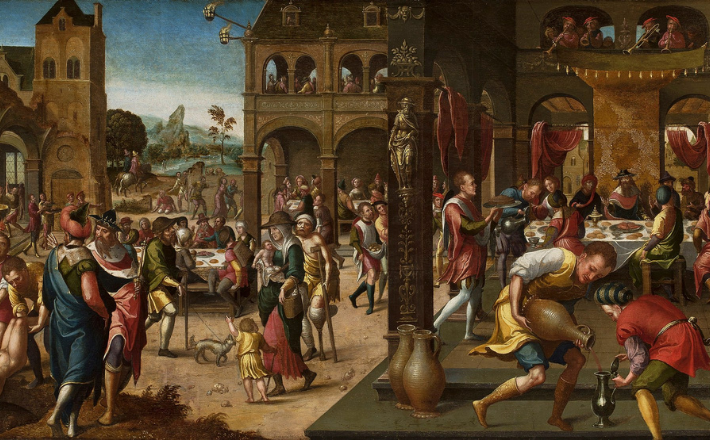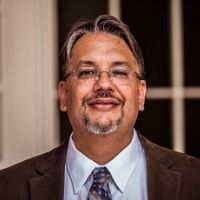Commentary on Psalm 112
What do people want from life?
When asked, a lot of us will say something like “Happiness.”
But how do we get happiness?
For many people, in ancient Israel and today, the key to happiness—or so they believe—is the acquisition of what Psalm 112 calls “wealth and riches” (verse 3).
But this sort of thinking, though it may be partly right, is also dangerously wrong.
Although for some (like the ancient Stoics), “virtue is its own reward,” for the rest of us, to be happy or to live well as human beings, some level of material well-being is necessary. But how much is enough? How much “wealth and riches” will suffice? (In)famously, when oil tycoon John D. Rockefeller was asked how much money was enough, he replied, “One dollar more.” It sounds as if Rockefeller’s desire for riches was insatiable—perhaps because he believed riches were the key to his happiness.
Ancient moral traditions have long recognized that humans often tend to think and act like Rockefeller.
We desire, and so value, some things too much—whether wealth, power, pleasure, social status, or something else—believing that attainment of these things is most important for our flourishing, what the ancient Greeks called eudaimonia. And although, as was hinted, some level of material well-being certainly can contribute to our happiness—and to some extent may even be necessary for us (it’s hard for anyone to flourish in abject poverty)—it is not sufficient. But many people seem not to understand this ancient truth and so pursue and strive to hold onto riches (and those other things we think will make us happy), if not at all costs, then inordinately so—more than we should.
A close reading of Psalm 112, however, points to the fact that not wealth and riches—or, for that matter, anything else—but rather virtue is indispensable to happiness. Most important in this regard, the psalm suggests, is to “fear the LORD” (verse 1)—a posture of reverence and acceptance of the divine—and to practice “righteousness” (verses 3, 4, 6, 9). The sorts of people who possess these broad virtues, the text says, are those who “delight” in following divine instruction (verse 2) and who are “gracious [and] merciful” (verse 4). They are generous, and they live by justice (verse 5). Unlike many people, the virtuous are not characterized by the pursuit and preservation of their wealth, but are recognized by how they give it away, generously supporting the poor and those in need (verse 9).
Through their everyday lives of virtue, the characters (or moral dispositions) of the sorts of virtuous people Psalm 112 imagines have become settled. Consequently, they do not flinch in the face of challenges to their way of life, but continue in their virtue. They are “not afraid” of what comes (verse 7), and “their hearts are steady” (verse 8). But only those who daily “practice” such virtue reach that moral plateau.
These are arresting perspectives that Psalm 112 offers. And in Ordinary Time, when we seek to grow and mature in our faith by reflection on the life of Jesus, the psalm can lead us to consider some of the Nazarene’s own remarkable teachings on similar themes (for example, “The Rich Young Ruler” in Mark 10:17–24; Matthew 19:16–30; Luke 18:18–30).
Psalm 112 also quite strikingly claims that the virtuous—those who fear the Lord; the righteous—will also experience well-being. Their houses will be full of “wealth and riches” (verse 3); it will be “well” with them (verse 5).
But we know better, don’t we? We know that the just, the faithful, the best Christians among us sometimes—too often, really—fall victim to disease, financial struggles, or the greed, ambition, or carelessness of others. As a result, they suffer in body, spirit, and mind.
Is the scripture wrong, then, with its promises of wealth and well-being to those who choose to travel a morally upright way? The answer may depend on what we understand the text’s claims actually to be.
It may be that the rhetoric of prosperity and well-being in Psalm 112 and texts like it, in pointing us to virtue as the indispensable ingredient for human well-being and happiness, is not making a literal promise to those who “behave properly.” Instead, its language of “reward” may be encouraging us to pursue what is of most value in human life, just as robustly as Rockefeller and those of his ilk have pursued the next dollar. It exhorts us to be voracious for the “true,” or genuine—even if not literal—“riches and wealth” of virtue—a way of life that can produce authentic thriving for humans.
Indeed, it is worth noting that the virtues and way of life the psalm promotes, and which constitute “true wealth,” are other-directed qualities. Implied in all this is the idea that humans are naturally social beings. The character traits the psalm speaks of represent the sorts of dispositions we all need in order to live well—in community. Saint Francis understood this. He, of course, famously prayed that key Christian virtues be exhibited in his life:
Lord, make me an instrument of your peace:
where there is hatred, let me sow love;
where there is injury, pardon;
where there is doubt, faith;
where there is despair, hope;
where there is darkness, light;
where there is sadness, joy.
But the man from Assisi asked not only for the most well-known of Christian virtues—love, faith, peace, hope. He explicitly asked the Divine to help him live a life focused on others too:
O divine Master, grant that I may not so much seek
to be consoled as to console,
to be understood as to understand,
to be loved as to love.
For it is in giving that we receive,
it is in pardoning that we are pardoned,
and it is in dying that we are born to eternal life.


August 31, 2025